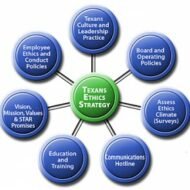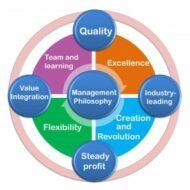Posted by Managementguru in Business Ethics, Business Management, Entrepreneurship, Organisational behaviour, Principles of Management
on Mar 15th, 2014 | 0 comments

The Origin of Unethical Behavior Ethical considerations in business are important to managers as it is to individuals in their personal lives. Personal life and business life cannot be perfectly separated with respect to moral judgements. A number of factors have been established as significant in making ethical standards a primary concern of business managers. What are Values? For the individual, the job is the centre of life, and its value must be, in harmony with the rest of life, if he is to be a whole and healthy personality. In an industrial society. The values tend to become those of the entire corporate culture. The public is insisting that business leaders are, in fact, responsible for the general social welfare and that the manager’s responsibilities go far beyond those of running the business. Even if the manager insists on a narrow definition of his role as possible, it is, however, essential that he takes these intangibles into consideration since they are the real motivating force in an organization. Expectations of the Society: If an organization did not behave in accordance with the social systems and expectations, it may not merely lose its market share but face another piece of legislated control and might also lose its very right to exist. Many a times managers may be forced to compromise their personal ethics and moral values in order to achieve organizational goals. Everyday ethical decisions are usually made between the lesser of the two evils rather than obvious right and wrong. Often it may be difficult for the manager to free himself from taking a biased attitude and look at issues objectively. In spite of good intentions, he becomes involved in the situation and it becomes difficult to retreat and take a detached point of view in examining the issue from an ethical standpoint. In the light of these problems, certain examples can be cited to answer the question as to what constitutes unethical behavior. Padding expense accounts to obtain reimbursement for questionable business expense. Revealing confidential information of trade secrets. Giving or accepting gifts or favors. Using company property and/or materials for personal use. Leaving the job without abiding by the sales contract. Being severely critical of competitors. Attempting to corner opportunities by bribing public officials. Price discrimination, unfair trade practices, unfair pricing etc. , Dishonesty in fulfilling contracts. Politics inside the organization. Unless and until the professional manager puts the interest of the organization in front of his own, places the duty to the society above his duty to the organization wholeheartedly, there is no point in talking about ethics in theory. Though a number of firms spend their time, money and energy in formulating statements, in reality their enthusiasm is lost in practice. The gap between the espoused and practiced values creates a dissonance in the minds of the people, and as a result in the...

Posted by Managementguru in Business Management, Motivation, Organisational behaviour, Principles of Management
on Mar 9th, 2014 | 0 comments

How well employees know about your Organization? Now, this is a million dollar question and a prominent issue that has to be taken care of when it comes to motivating your employees. Transparency is a booster pack that works out wonders in the area of motivation. 25 Great Motivational Quotes to Kickstart Your Life How can a management be transparent in key areas like finance and business deals, my question is WHY NOT? The success of operations of a firm relies solely upon the performance of individuals who work towards the accomplishment of goals. They are the key persons who should be kept abreast about the activities of the firm. What makes some organizations stand out? When the Boss wants each and every employee to be truthful and loyal to him, the same expectancy would be there on the part of the workforce –Why don’t the bosses understand this? Integrated Organizational Development I would cite TVS Group as a classic example that commands respect from the employees and many a times I’ve heard people say that they are proud to work for TVS. What makes the employees so motivated to work for certain firms overlooking the pay scale and perks? One should deeply delve into the psychological theories that support motivation, perception and attitude. Etiquette of the company: This is one thing that a firm has to clearly communicate to its work force. The ideology and principle behind the running of the business should be genuine and authentic. The pathway to achieve those missions should be realistic and achievable-to put it clearly a firm should have its business roots stemming out from clear cut intent and purpose. When JRD Tata wanted to start a steel plant in India, not many believed it to be a possible venture. The business legend had clear cut intent of installing a steel plant to utilize the resources available in India and to pass on the proceeds for the economic benefit of the country. Nobody suspected his intent; such was his determination and resolve. This infographic beautifully portraits the scenario of how the future employees would be: Communication of Goals: The management will have clear plans of production target which has to be communicated properly to the lowest level with the same amount of clarity. This has to be done via channels or different levels of management and executives have to play their roles properly. Nobody needs to show their prowess or power; only thing needed is proper delegation of authority and responsibility. This gives clear direction to the work force and when their immediate boss sits with them for periodic discussions to decide on the short term as well as long term objectives, they feel part of the show which immensely motivates them. Ethical Standards of the company: This again adds image to the company and “As is the Leader so is the Employee.” The management should not involve itself in any kind of lobbying – When there is political corruption, malpractices become the order of the day. What Kind of a Leader Are You? A country like India needs more educated leaders who can bring awareness on the importance of economic independence and even distribution of wealth to the masses. If people clearly know what is right and what is wrong, the unwanted elements cannot take them for a ride. Given the population, India though marching towards becoming a developed nation, the growth is hindered by poor policy decisions and sky rocketing inflation. Clarity in Structure: Ego clashes start when the organizations have more number of levels and generate chaos in communication. Misunderstanding creeps in because there...

Posted by Managementguru in Business Management, Organisational behaviour, Principles of Management
on Mar 6th, 2014 | 0 comments

Corporate Philosophy of Management CORPORATE PHILOSOPHY OF MANAGEMENT calls for creating a framework of values, beliefs and ethical standards which are considered to be vital for an effective management. They must be embedded in formal and informal philosophical statements which are then communicated to the fraternity of that organization. From a broader perspective, the LEADER has to have a VISION as to where he is heading his company in the next three to four years. Corporate Objectives provide vision as well as direction and map for bold decisions to be taken regarding NEW MARKETS MARKET SHARE PRODUCTS SERVICES etc. , Now the organization is in a position to decide and prioritise the VALUES AND COMPETENCIES it expects from its managers. For example, if the situation favors the business expansion to new markets, say, European or Asian, then an organization has to develop competence in areas like LANGUAGE AND CULTURE, besides marketing and business skills. Different Philosophies of Management: Well, you might have been inspired with JAPANESE PHILOSOPHY OF MANAGEMENT, EASTERN OR WESTERN PHILOSOPHY OF MANAGEMENT t. But what is the fun? If you don’t have A SOUND MANAGEMENT PHILOSOPHY of your own, to simply put it, you don’t have a broad set of principles to back up your management development process which is a generic one. Ideally speaking, you should be able to develop a concrete SYSTEM that is made up of FOOL PROOF policies and procedures; try to develop a professional team of executives who can take up your vision to the next level; these measures will prove worthwhile in the long run. You are left without any choice but to develop “truly” INTERNATIONAL MANAGERS who could transcend nationally and the location of any specific job consideration. This is what Ideal management philosophy means to me, A holistic vision of the future A solid set of principles(values, beliefs) Sound policy definition Management development programmes Autonomy to my work force Always “yes “to new technology Development of women managers Flexible leadership Social responsibility Contribution to the growth of my Country’s economy Strategic Perspective: Major environmental shifts now demand a more strategic perspective from those who manage and lead in organizations; “GLOBALISING” in the quest for major market share brings in new opportunities for growth and prosperity. Organizations are now espousing values that regard people, not as costs to be minimized, but AS “ASSETS TO BE MAINTAINED AND DEVELOPED.” An open systems approach of management is likely to overcome many of the problems created by the piecemeal approach. Instead of looking at management development in isolation, see it as an integral part of a wider organizational system that takes care of the processes through which people working for the firm take care of themselves leading to self...






